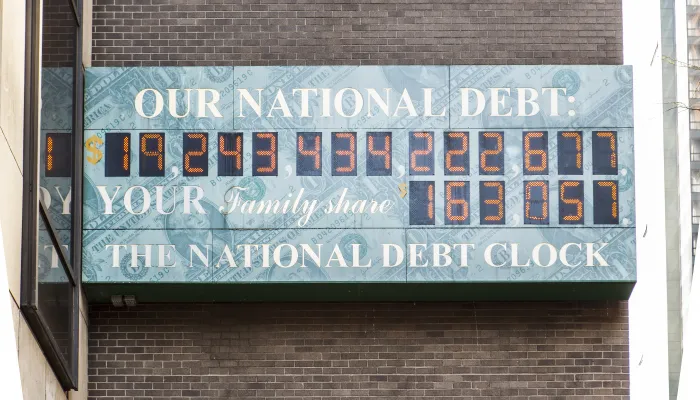Erskine Bowles: Urgency of Federal Deficit Remains
Erskine Bowles is a former co-chair of the Simpson-Bowles Fiscal Commission and member of the Committee for a Responsible Federal Budget. He wrote an op-ed that appeared in USA Today.
The good news that the budget deficit declined to $486 billion in fiscal year 2014 has prompted a declaration in some circles that the deficit is no longer a concern, and we should now turn our focus to making investments in economic growth. This either/or analysis is shortsighted and the source of many of our nation's current problems created by both parties. America is and will continue to be constrained from pursuing dynamic economic growth opportunities and from making smart investments in the future until we put our budget on a fiscally sustainable course.
I wish I could believe the recent decline in the deficit is sustainable. The temporary factors related to the recession — which caused the deficit to increase dramatically — are now receding, but the structural problems with our budget remain.
Temporary measures
Congress and the administration have taken some actions to reduce the deficit, but they have done only the easy stuff — raising taxes on the wealthy and capping future discretionary spending — and the stupid stuff — sequestration, which makes across-the-board cuts in discretionary spending without a thought as to whether this spending is economically or militarily necessary or productive. Congress and the administration have avoided acting on the tough stuff. As a result, the economy limps forward, and the deficit is projected to return to an upward path over the rest of the decade and beyond.
We do not need to abandon debt reduction in order to make the smart investments necessary to compete in a knowledge-based global economy. Unless we deal with our debt, the growth of spending on entitlement programs and interest on our debt will leave fewer resources to invest in our future. We should make investments in education, infrastructure and research in the context of a plan that puts our budget on a fiscally sustainable course.
One of the key principles set forth by the National Commission on Fiscal Responsibility and Reform, which I co-chaired with my friend Republican Alan Simpson, was that budget cuts should be phased in gradually to avoid disrupting the fragile economic recovery while reducing debt over the long term. Our report also emphasized the importance of investments to support economic growth while also enacting pro-growth tax reform to help American workers and businesses compete in the global economy. We put forward a plan that met those goals while reducing the debt as a share of the economy over the long term through a combination of spending cuts, reforms of entitlement programs and comprehensive tax reform.
Hobbled recovery
Unfortunately, policymakers failed to follow those recommendations, and we ended up with a fiscal policy that took the opposite approach. Instead of enacting a thoughtful, comprehensive fiscal plan that gradually reduced the deficit and put the budget on a fiscally sustainable long-term path, Washington allowed abrupt cuts from sequestration to take effect, harming the economic recovery and cutting important investments that could jeopardize future prosperity. And, for all that pain, the sequester does almost nothing to deal with the long-term drivers of our growing debt.
A plan to deal with our debt must include structural entitlement reforms to slow the growth of federal health spending and make Social Security solvent while protecting vulnerable populations. It should include fundamental tax reform that simplifies the code, gets rid of backdoor spending and reduces rates in a progressive manner, thereby encouraging economic growth and generating revenue for deficit reduction. And it should replace some of the sequester cuts with more sensible cuts in lower priority spending. The savings should be phased in to avoid disrupting our economic recovery.
Some would say that is politically impossible. But it is my generation's responsibility to deal with our fiscal mess. If we don't, we will be the first generation of Americans to leave our country worse off than we found it. Republicans and Democrats alike have been kicking the can down the road for far too long.
All of us need to help politicians make these tough decisions. My hope has been and remains that if they know we have their back, they will.
"My Views" are works published by members of the Committee for a Responsible Federal Budget, but they do not necessarily reflect the views of all members of the committee.


